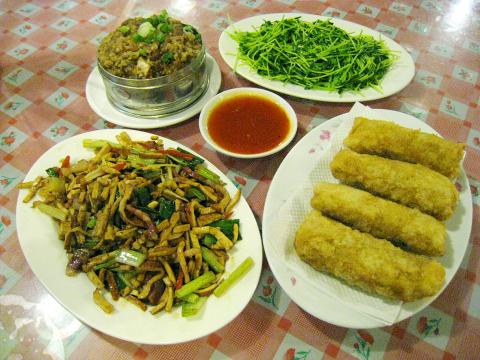Diners who stumble across Lukuang Noodle Shop (陸光麵館) could feel they’ve stumbled back in time. Black-and-white photographs of Chiang Kai-shek (蔣介石) and Chiang Ching-kuo (蔣經國) and a framed diploma issued by the Whampoa Military Academy in 1938 decorate the walls. A calendar from 1970 and a rusted antique electric fan also speak of bygone times. They are all part of proprietor Li I-li’s (李毅理) effort to revive his childhood memories of life in a juancun (眷村), or veterans’ village.
Having grown up in a now-demolished military village in New Taipei City’s (新北市) Wugu District (五股), Li opened the establishment after prolific television producer Wang Wei-chung’s (王偉忠) successful television drama Time Story (光陰的故事) and sold-out theatrical production The Village (寶島一村) kindled public interest in the vanishing culture of the veterans’ communities in 2008. Since then, Lukuang Noodle Shop has quickly become a popular spot known for simple juancun fare, which costs little but tastes good.
Lukuang’s menu is handwritten on cardboard and subject to frequent change. Judging from my several visits, the stinky tofu roll with shrimp (蝦仁臭豆腐捲, NT$120) seems to be one of the perennial favorites on the restaurant’s plain round tables. The irresistible dish is composed of finely pounded stinky tofu, shrimp and chopped coriander leaves that are wrapped in a tofu sheet and then deep-fried. The flavor is pleasantly mild and should be acceptable even to those who usually find the fermented soybean product hard to swallow.

Photo: Ho Yi, Taipei Times
The Lukuang fried combo (陸光小炒, NT$180) is a saliva-inducing example of northern Chinese-style home cooking that delights the taste buds with bustling flavors of sliced dried tofu, preserved pork, celery, scallion and chili. The eatery’s rendition of steamed spareribs (粉蒸排骨, NT$100) uses less chili than most versions and lean meat. The ribs are cooked to a lightly dried perfection and served on a bed of sweet potato chunks.
Lukuang’s biggest surprise, however, comes in the inconspicuous form of dumplings (NT$6 each). Its leek dumplings are among the best I have tried: The vegetable’s piquant taste is subdued, allowing the juicy stuffing to diffuse in the mouth.
The menu also features a few varieties of noodle dishes that are prepared at a noodle stand outside the eatery’s wooden entrance door. Inside, a cabinet displays a selection of luwei (滷味), or soy sauce-marinated snack food, that ranges from pig tongue and intestines to tofu and vegetables.
Lukuang is a two-minute walk from the intersection of Civic Boulevard (市民大道) and Dunhua South Road (敦化南路). Those who like what they see and eat at Lukuang may also want to check out Tsun Tzu Kou (村子口, see the Taipei Times review on April 17, 2009), another popular juancun eatery that appears frozen in the 1950s.

In the March 9 edition of the Taipei Times a piece by Ninon Godefroy ran with the headine “The quiet, gentle rhythm of Taiwan.” It started with the line “Taiwan is a small, humble place. There is no Eiffel Tower, no pyramids — no singular attraction that draws the world’s attention.” I laughed out loud at that. This was out of no disrespect for the author or the piece, which made some interesting analogies and good points about how both Din Tai Fung’s and Taiwan Semiconductor Manufacturing Co’s (TSMC, 台積電) meticulous attention to detail and quality are not quite up to

April 21 to April 27 Hsieh Er’s (謝娥) political fortunes were rising fast after she got out of jail and joined the Chinese Nationalist Party (KMT) in December 1945. Not only did she hold key positions in various committees, she was elected the only woman on the Taipei City Council and headed to Nanjing in 1946 as the sole Taiwanese female representative to the National Constituent Assembly. With the support of first lady Soong May-ling (宋美齡), she started the Taipei Women’s Association and Taiwan Provincial Women’s Association, where she

It is one of the more remarkable facts of Taiwan history that it was never occupied or claimed by any of the numerous kingdoms of southern China — Han or otherwise — that lay just across the water from it. None of their brilliant ministers ever discovered that Taiwan was a “core interest” of the state whose annexation was “inevitable.” As Paul Kua notes in an excellent monograph laying out how the Portuguese gave Taiwan the name “Formosa,” the first Europeans to express an interest in occupying Taiwan were the Spanish. Tonio Andrade in his seminal work, How Taiwan Became Chinese,

Mongolian influencer Anudari Daarya looks effortlessly glamorous and carefree in her social media posts — but the classically trained pianist’s road to acceptance as a transgender artist has been anything but easy. She is one of a growing number of Mongolian LGBTQ youth challenging stereotypes and fighting for acceptance through media representation in the socially conservative country. LGBTQ Mongolians often hide their identities from their employers and colleagues for fear of discrimination, with a survey by the non-profit LGBT Centre Mongolia showing that only 20 percent of people felt comfortable coming out at work. Daarya, 25, said she has faced discrimination since she